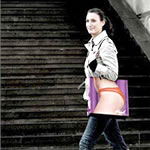Women’s underwear is likely to get men thinking about sex, but might it also change apparently unrelated behaviours?
New research conducted by Bram Van den Bergh and colleagues finds that sexual stimuli actually make some men impatient to receive a reward that has little to do with sex.
In a series of studies researchers exposed men firstly to pictures of ‘non-nude female models’, then to bras, then to a film of hundreds of young women running in bikinis. These conditions were compared with equivalent non-sexual stimuli.
In each case, after being exposed to the sexual stimuli, men were more likely to want a smaller monetary or food-based reward right now, rather than waiting until later for a larger reward. Being reminded about sex reduced most men’s ability to delay self-gratification for a greater eventual payoff.
Not all men, though, reacted in the same way to the sexual stimuli. There was a sliding scale of reactivity with some men having relatively insensitive reward systems. This meant that they did not become impatient for a reward after exposure to the sexual stimuli.
This is not the first study to show how being in a ‘hot’ – although not necessarily sexual – state can affect decision-making:
- Hungry people have been shown to buy more food and prefer candy over fruit for the quick calorie boost.
- Behavioural economist Dan Ariely and colleagues have looked at the effects of being sexually aroused on other sexual behaviours. Their research found that aroused men were much more likely to find a woman sexy when sweating or to enjoy being tied up by a woman or to think that, overall, wearing a condom was less desirable.
This new study shows the effect of arousal in one domain generalising to another domain. The fact that for many men the effect of sexual stimulation crossed over into relatively unrelated domains like money and food suggests that the brain has a fairly generalised rewards system.
» Related: how our emotions affect our spending (and what to do about it).
[Image credit: liveu4]

